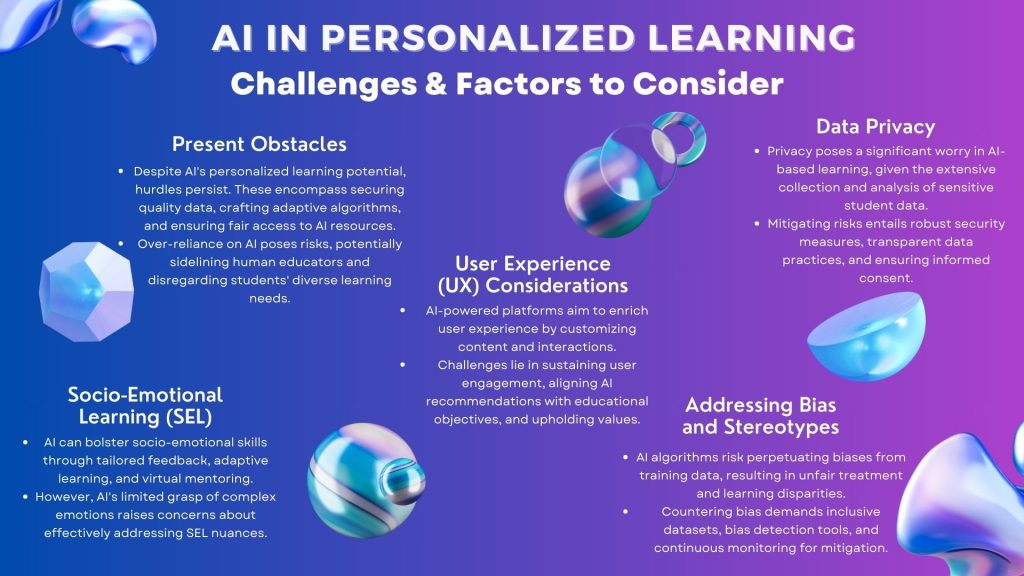Exploring AI for Personalized Learning
- Catherine McFee
- May 10, 2024
- 4 min read

By Ano Gwesu, Asha Khan, Catherine Mcfee, Radhika Arora, Tracy Tang
In the dynamic landscape of modern education, the integration of artificial intelligence (AI) has opened up exciting possibilities to revolutionize how students learn. Our journey into the realm of personalized learning has been one of exploration as we seek to understand how AI can tailor educational experiences to meet the diverse needs of learners. However, amidst the promises of enhanced learning outcomes, we have encountered significant challenges and ethical considerations that demand careful attention.
Exploring AI's Educational Potential
At the core of our inquiry lies the intersection of AI and personalized learning, where algorithms analyze individual learners' goals, strengths, and progress to deliver tailored content and feedback (Vetter et al., 2024). Through platforms like Udemy and Coursera, we have explored different courses, each offering unique insights into the application of AI in education. From practical guides for educators on leveraging AI in the classroom to innovative approaches utilizing AI technologies like ChatGPT, we have observed the transformative power of AI in shaping the future of learning.
Comparing Platforms: Understanding Education
Our investigation has led us to compare platforms such as Udemy and Coursera, each offering distinct advantages and learning experiences. Udemy's emphasis on flexibility and accessibility allows learners to progress at their own pace, while Coursera's structured approach offers academic rigour and accreditation options. We have gained valuable insights into the diverse online learning ecosystem by examining the course content, platform features, and instructor expertise.
Enhancing User Experience in AI-Personalized Learning
Our exploration underscored the critical role of precise prompts when utilizing platforms like ChatGPT for tailored learning experiences. This significance is further underscored in the course materials and West-Soley’s (2023) book, "AI for Language Learners," which delves into techniques like capitalizing specific words to emphasize key concepts (West-Soley, 2023).
There are notable advantages to user experience. For instance, Duolingo boasts a free-to-use model, a user-friendly interface, and gamification elements that effectively motivate learners (Munday, 2015). Moreover, the platform offers accessibility and engagement for many users.
However, amidst these advantages, certain limitations also emerge. For instance, Duolingo's personalization features are accessible only to paid members, and some learners report finding the lessons repetitive (Anderson & Charaf, 2020). Additionally, while ChatGPT offers the promise of tailored learning experiences, occasional errors have been observed, suggesting room for improvement in its implementation.
Challenges: Equity and Ethics
Nevertheless, as we delve deeper, we face pressing challenges that warrant our attention. The promise of AI-driven personalized learning must be tempered with a commitment to equity and inclusivity. We recognize that not all students have equal access to technology or the digital skills necessary to fully engage with AI-powered platforms (Warschauer & Matuchniak, 2010). Moreover, it must be acknowledged and understood by users of AI tools that large language models reflect all the racial and gender biases of the datasets on which they have been trained (Gordon, 2023). As we tread the path of AI-driven education, we must prioritize fairness, transparency, and accountability to ensure that technology is a force for good in education.
Empowering Teachers
Amidst the excitement surrounding AI in education, we must not lose sight of the indispensable role of educators. While AI can enhance learning experiences, it cannot replace the human connection and subtle understanding that teachers provide (Warschauer & Matuchniak, 2010). We advocate for a holistic approach that combines AI-driven tools' strengths with educators' expertise and empathy. By empowering teachers with AI technologies and fostering collaborative learning environments, we can ensure students receive personalized support and guidance tailored to their unique needs.
Balancing SEL and Privacy
In our exploration of AI in education also highlights its potential to enhance socio-emotional learning (SEL) by providing personalized feedback and insights (Vetter et al., 2024). However, we must tread carefully to ensure that these insights are leveraged ethically and responsibly. While AI can offer valuable feedback on emotional triggers and interpersonal skills, we must prioritize the privacy and autonomy of learners (Cavoukian & Jonas, 2012). By designing inclusive systems that uphold the dignity and agency of students, we can harness the transformative potential of AI to foster holistic growth and well-being.
Personalized Education with AI
We are excited about the endless possibilities ahead as we wrap up our exploration of personalized learning and AI. By addressing equity, privacy, and ethics issues with care and empathy, we can shape a future where education is accessible and uplifting for everyone. Let us seize this chance to leverage AI's potential and ensure every learner can flourish. Moving forward, we will delve deeper into specific aspects of AI in personalized learning through our individual research endeavours.
References
Anderson, P., & Charaf, A. (2020). The reviews of users of the duolingo application: Usability and objectivity in the learning process. International Journal of Research - Granthaalayah. https://doi.org/10.29121/granthaalayah.v8.i9.2020.1326
Cavoukian, A., & Jonas, J. (2012). Privacy by Design in the Age of Big Data.
Gordon, R. (2023, March 3). Large language models are biased. Can logic help save them? MIT
News | Massachusetts Institute of Technology. https://news.mit.edu/2023/large-language-models-are-biased-can-logic-help-save-them-0303
Munday, P. (2015). The case for using duolingo as part of the language classroom experience. RIED. Revista Iberoamericana de Educación a Distancia, 19(1). https://doi.org/10.5944/ried.19.1.14581
Vetter, M. A., Lucia, B., Jiang, J., & Othman, M. (2024). Towards a framework for local
interrogation of AI ethics: A case study on text generators, academic integrity, and composing with ChatGPT. Computers and Composition, 71, 102831–102831. https://doi.org/10.1016/j.compcom.2024.102831
Warschauer, M., & Matuchniak, T. (2010). New technology and digital worlds: Analyzing
evidence of equity in access, use, and outcomes. Review of Research in Education, 34(1), 179–225. https://doi.org/10.3102/0091732x09349791
West-Soley, R. (2023). A.I. for language learners: Over fifty exciting prompt ideas for creating your own perfect learning assistant. Rich West-Soley, 2023.



Comments